This article previously appeared on Crossfader
I want to love SEA OF THIEVES.
In fact, in a lot of ways, I do. I have spent many nights alongside fellow pirates, laughing over chat, drinking barrels of grog, and sinking enemy ships. I can perfectly recall our first encounter with a kraken at sea: the waves of panic flowing into our bodies only matched in power by the stormy ocean pounding against our galleon, bolts of lightning illuminating the sky, and our yells of commands to navigate through the towering tentacles overhead.
But, after those early nights, I don’t feel a need to journey back onto the seas. I’ve made my memories, but there isn’t much new to draw me back again and again. I’m already tired of killing the same skeletons over and over. By the second fetch quest, I was already sick of traveling to random islands to catch a certain animal for trade. Even the hunt of treasure has grown old, as I realized I can only spend the gold I earn on slightly nicer looking hats. And when I do decide to go explore on my own, to discover new islands or encounters, I only find barren islands and encampments, devoid of any interactions or mysteries.
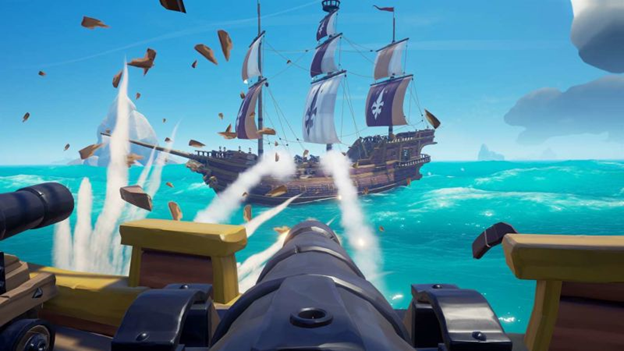
That galleon isn’t the only one with a sinking feeling
My hope for adventure isn’t completely dead, however. A stranger, standing in the corner of the tavern at each settlement, teases me with a mysterious proposition in riddles. Should I prove myself worthy by gaining a few levels in each of the game’s three factions, I could learn what lies behind the door he protects. I immediately go to work, advancing to the necessary levels of renown and heading back for a conversation, only to find he’s changed the prerequisites to a higher level. After a few moments of research, I learn that this pattern continues. His original offer stood at level five for each faction, but will continue to grow until reaching level 50.
The only tangible thread to generate further excitement for the game is artificial. I figured after a few mundane quests I would experience something truly unique, but instead, it was only a tease, a dangling cookie to be pulled away whenever I felt close. This NPC, though only a tiny drop in an ocean, is emblematic of my grievances with SEA OF THIEVES and its creators.
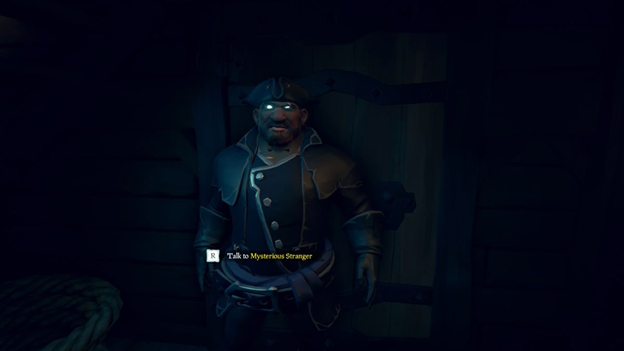
All hype
There’s no other way to put it: SEA OF THIEVES is unfinished. Polished in many ways, yes, but launched as a springboard to evolve in the future. Rare has said the game will feature frequent updates to content and bugs, and they have already begun to fulfill this promise. The developer has recently enumerated numerous additions, including a new enemy type and weekly events that should arrive in the next month or so. But launching with a $60 price tag, I have to ask: shouldn’t I feel confident that I am playing a complete game at launch? Particularly one that has been sold to me as a truly “next gen” experience?
What’s worse is this isn’t the first time I have felt the need to ask this question. It appears to be growing more and more common that video games should launch in their infancy, so that players might grow alongside their new obsession. The “service game” isn’t a new concept, and it has been effective in prolonging sales of products, but publishers are increasingly using the model as license to prolong the development, not the expansion, of titles past the release date.
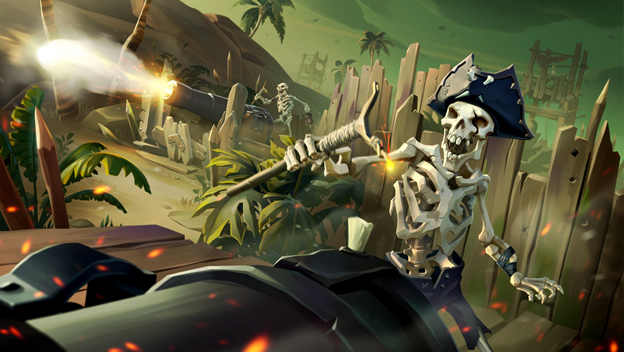
Me, waiting for my purchase to be justified
Case in point: the original DESTINY. At launch, the game was found to be lacking in content, featuring a campaign that felt barely strung together, and an end game that forced players to replay missions over and over. And yet, two years later, that game had released multiple expansions that retooled player progression, new modes of cooperative and competitive content, and strengthened the narrative of the universe.
After two years of the game occupying store shelves, I finally felt confident in describing DESTINY as “complete.” But should that be satisfactory? Should that be the standard the industry should strive for? Considering both the asking price of your average AAA shooter and the mountains of microtransactions that amass on top of that, it’s easy to see the financial incentive for publishers to string players along. After all, it worked well enough that we now have a DESTINY 2. But is pushing incomplete products a sustainable business strategy? Just ask Activision Blizzard how their sequel is doing less than a year after launch.
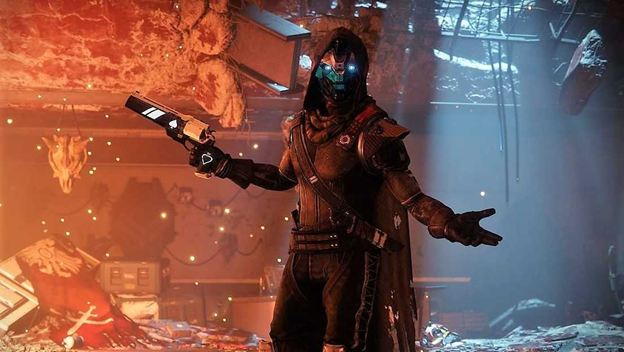
Shaders COULD have been a good idea, right guys?
This practice of launching glorified betas has grown more and more apparent in this console cycle due to games’ ability to grow and evolve over time due to downloadable content and frequent updates. Publishers offer an inherent promise at time of purchase: “give us $60 and we will eventually offer you the full value of your purchase.” The problem is that they are described and sold as complete products. The consumer is completely oblivious to the inherent promise until after the sale is made.
This should sound awfully familiar to anyone who knows the “Early Access Game” genre, in which developers offer their game for sale—in an unfinished state for a discounted price—for feedback from players and to fund development. But these games are sold as “in development” and consumers are aware of this almost every time they boot up the game. And almost always, they lack a massive publisher or strong financial backing to fund the development. The use of “early access” allows them to work on the project to reach completion, not unlike products on Kickstarter.
I understand why these games exist and I do not argue their existence. My problem is with games like THE DIVISION, BATTLEFRONT, EVOLVE, or STREET FIGHTER 5. These all launched as an idea, a baseline to grow and foster. But these games are not developed by independent teams, personally financed to produce a dream product. They are backed by well known publishers and developers, with millions of dollars as a budget, and yet they are released incomplete. I compare them to the likes of SUPER MARIO ODYSSEY, HALO 5, TOMB RAIDER, or even Call of Duty. All of them released as a complete and incredibly well made package, and even offered downloadable content to extend the value of the game.
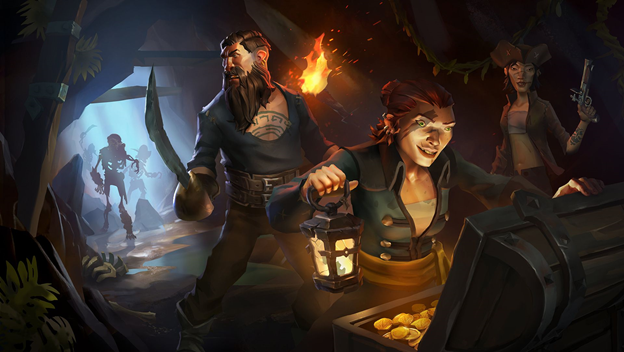
Rare’s business strategy
The cost to produce a video game is high. I understand that. I also recognize the pressure to release a game by its announced release date. But as an avid gamer, I don’t want to pay for an incomplete game that is sold as a finished product. I don’t want to be sold a promise. I want developers to be able to craft their truest vision and offer it all at once for me to purchase and experience.
Many of the games I have listed grew and evolved to ultimately become wholesome and incredibly experiences. A game like RAINBOW SIX: SIEGE seems to only grow stronger over time. But this should not be the ideal scenario. As consumers and developers, we shouldn’t aspire for this. The video game industry can’t be known as an industry of “promises,” whether they are faithful or not.
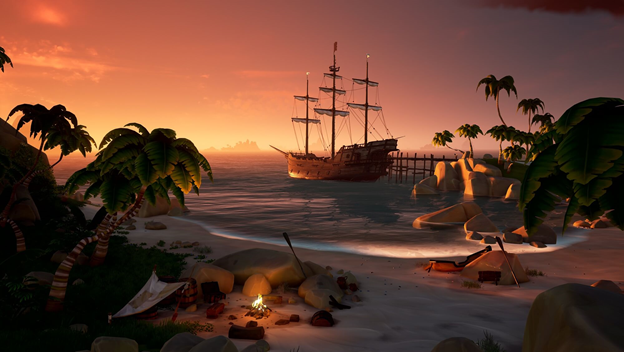
If only the sun would set on lazy publishing
SEA OF THIEVES has moments of spectacular adventure, cooperation, and emergent gameplay that evolves and escalates when you least expect it. But it is also a massive world seemingly devoid of interesting characters, quests, or progression, and full of disappointment. I have no doubt the game will continue to grow and evolve over time and turn into something truly special. It already captures something truly unique. I just wish I could easily recommend it as a purchase now, but I can’t, not as it is.
As it stands, the adventure revolves around either generic and repetitive quests or dynamic engagement with other players for underwhelming loot. When the Sea of Thieves is populated with thrilling quests, cooperative experiences, captivating locations, and dangerous enemies, I will be excited to venture onto the water and hunt for treasure. But until then, I just wait and hope that potential can be reached.
When I go out to eat, I want a full plate. I don’t want to be served a burger without the bun only to be told, “Don’t worry, the rest will come later. Just be patient.”







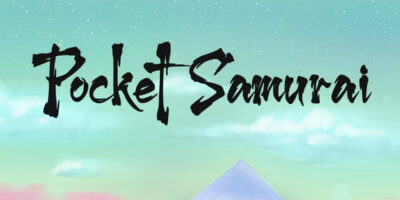
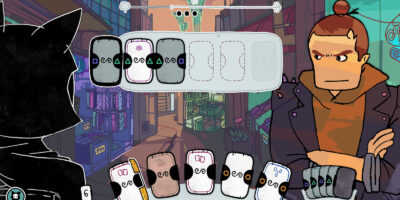







Comments